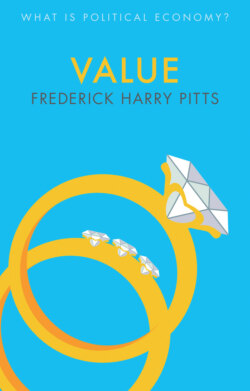Читать книгу Value - Frederick Harry Pitts - Страница 8
1Value as Substance
ОглавлениеSubstantialist approaches to value posit the labour content of a good or service as ‘an order-bestowing force’, as opposed to anything external to it.1 Substantialist theories of value see value as carried and conserved within things, either inhering within the things themselves or inserted there by the labour that created them. They rest on a series of defining positions: the ascription of a natural basis to economic value; the suggestion that value is conserved from the production through to the exchange of products; the ‘reification’ of the economy as an orderly ‘law-governed structure’ akin to nature; the proposal of an ‘invariant standard’ of value; the policing of a boundary between activities productive and unproductive of value; the conviction that the sphere of production is where value is determined; and the resulting ‘relegation’ of money to a purely ‘epiphenomenal status’ expressive of embodied labour.2 As with so much else in value theory, we can trace this line of interpretation to Aristotle, who located in labour a common element underlying the mystery of the equivalent exchange of diverse goods.3
In the modern age, theories of value mimicked the development of Western physics.4 When the physics of energy conservation was the only science available, the first stirrings of substantialism in ‘balance of trade’ mercantilism took on the Cartesian insight that motion is an ‘embodied substance … passed about from body to body by means of collision’, reifying value as a substance ‘conserved in the activity of trade to provide structural stability to prices and differentially specified in the process of production’.5 Taking this analogy forwards, where the substantialist approach really comes alive is in the work of the physiocrats and, later, the classical political economists. In the Wealth of Nations, Adam Smith suggests that ‘It is natural that what is usually the produce of two days’ or two hours’ labour, should be worth double of what is usually the produce of one day’s or one hour’s labour’, a position later taken up by David Ricardo and, to some extent, Karl Marx.6
From mercantilism onwards, the trajectory of substantialism and associated ‘objective’ theories of value from the seventeenth century was also deeply imbricated in social and political shifts, and served the purposes of different actors at different times in different places, with consequences by turns reformist, reactionary and revolutionary. Mercantilism buttressed the social power of the rising merchant class with a zero-sum understanding of value as bound within national borders in the face of expanding international trade; physiocracy buttressed the power of agriculturalists against mercantile interests; classical political economy, the power of industrialists against feudal remnants; and Marx’s version of the labour theory of value, the power of the increasingly assertive proletariat against the industrialists. Today, the national populist tenor of the times grants conservationist appreciations of value as a zero-sum game or substance in time and space fresh political potency, rendering the study of substance theories of value newly relevant. The present-day salience of such thinking shows that the problem of value is by no means a drily academic topic, but one that touches everyday life and current affairs.
